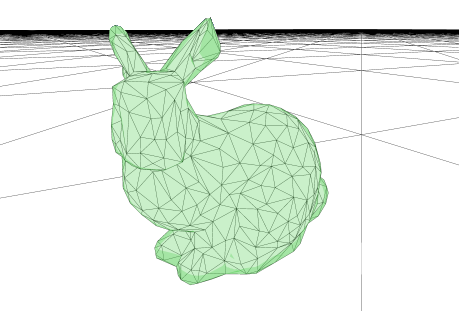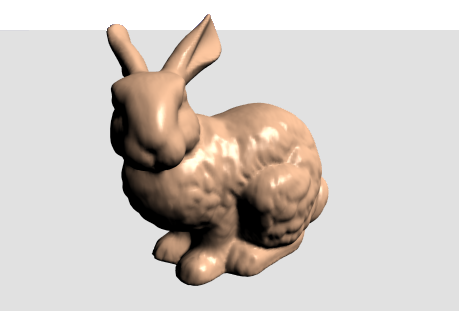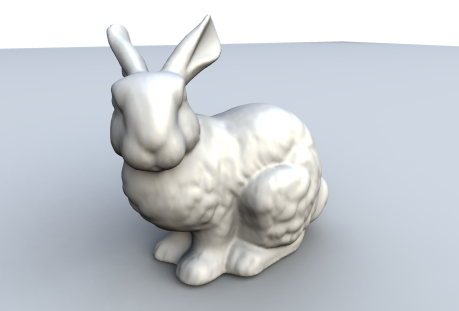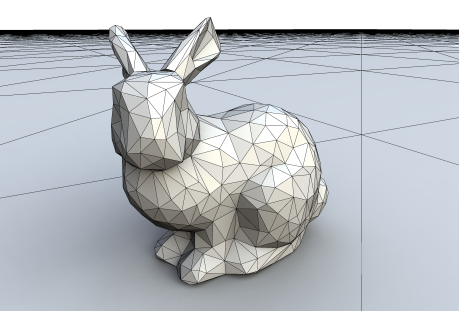Graphics
Universiteit Utrecht - Information and Computing Sciences
academic year 2013/14 – 4th period
 |
 |
 |
GraphicsUniversiteit Utrecht - Information and Computing Sciencesacademic year 2013/14 – 4th period |
|||
|
Navigation |
||||||||
|
| ||||||||
News |
Recent news August 22:
July 14:
How to use this website: Any changes made to this site are posted in this "news" section. The links lead you to the updated sections of the web page (some also provide complementary direct links to newly available documents / PDFs). We will also post news for some of the important announcements that have been made during the lecture.
|
Course Overview
|

Course: "Graphics" is an introductory lecture about computer graphics. Computer graphics deals with the algorithmic processing of visual (images) and spatial (geometry) data. The lecture will focus on the very basics of modeling and rendering, i.e., the mathematical description of three-dimensional scenes and how to create (realistic) images of such models. This is the core area of computer graphics. Math: The course will start with a short coverage of the mathematical basics needed for computer graphics. This part will introduce fundamental concepts of linear algebra and other areas of higher mathematics that are important far beyond the field of graphics. Foundations of computer graphics: Next, we discuss the foundations of computer graphics, such as transformations and projection of 3D models, hidden surface removal, triangle rasterization, shading, texture mapping, shadows, and ray tracing. Finally, we will also look briefly into more advanced topics in physically-based global illumination (more details are discussed in the master course "Advanced Graphics"). The lecture will be given in English. |
Lecture
|
|
Lecturer: Michael Wand ( Teaching Assistants:
Lecture:
Theory Tutorials: Thu 15h-17h (after the lecture, four parallel slots)
Practicals tutorial/consultation hours (all in Room BBL 175). Practical tutorials are offered before and after the lecture (theory tutorials) on Tue and Thu.
Practical tutorials start on Tue Apr 29 (second week of the lecture).
|
Topics |
|
|
|
The list is intended to give a rough orientation; topics might still be subject to change, and additional aspects might be covered. |
Lecture Slides & Recommended Readings
|
|
Below is a list of all lectures with a very brief summary of the topics, slides downloads, and recommended readings to prepare for the lecture. |
|
|
|
||||||||
|
|
|
||||||||
|
|
|
| Midterm Exam Thu, May 22 |
|
Midterm Exam: Thu May 22 2014, 13:30-15:30 in Room EDUC-BETA. |
|
|
|
|
|
|
|
|
| Final Exam Thu, July 03 |
Final Exam: Thu July 03 2014, 17:00-20:00 in Room EDUC-BETA. |
| Retake Exam Fri, August 15 |
Retake Exam: Fri August 15 2014, 09:00-12:00 in Room EDUC-ALPHA. |
Course Schedule
|
||||||||||||||||||||||||||||||||||||||||||||||||||||||||||||||||||||||||||||||||||||||||||||||||||||||||||||||||||||||||||||||||||||||||||||||||||||||||||||||||||||||||||||||||||||||||||||
|
Period 4 Schedule
| ||||||||||||||||||||||||||||||||||||||||||||||||||||||||||||||||||||||||||||||||||||||||||||||||||||||||||||||||||||||||||||||||||||||||||||||||||||||||||||||||||||||||||||||||||||||||||||
Tutorials
|
|
Overview The lectures are accompanied by tutorials (werkcolleges).
Tutorial Sessions
Assignment Sheets / Downloads Download the tutorials below:
|
Practicals
|
|
PRACTICAL ASSIGNMENTS There will be three practical assignments, covering traditional rasterization algorithms and shaders. The first assignment will be online on Tuesday, April 22. We recommend that you start working on it right away. Practicals tutorial/consultation hours During the following time slots, teaching assistants will be present in Room BBL175 to help you if you have questions (consultation hours will start in the second week of the lecture). Practical tutorials are offered before and after the lecture (theory tutorials) on Tue and Thu afternoon:
Remarks:
Important Rules Because of the large group of students taking this lecture, we need strict rules to keep everything managable. The most important rules are listed below. Further explanations might be given during the lecture.
Soft- / Hardware and Infrastructure:
Forum: There is an online discussion forum where the TAs answer your question (this is a best-effort offer; no guarantees; in particular, close to deadlines): http://graphics14.amulware.net (Thanks to Paul Scharf for setting this up!)
Assignments: The assignments are be provided for download below. The first assignment will be published on the afternoon of Tuesday, Apr 22. |
|
|
|
|
The first assignment is a tutorial gives you a walkthrough of the XNA framework that we'll be using. I will also introduce some of the basics of graphics programming. It is based on an online tutorial written by Riemer Grootjans (see here for Riemer's 3D Series 1: Terrain tutorial). If you do not feel challenged enough from this course and want to learn more, you might want to check out his other tutorials as well. Because we needed to make some adaptations to the tutorial to fit the needs of the course and local restrictions, it is password protected. You get the password in the first lecture (or you can ask your friendly TA about it). Downloads:
Deadline(s):
The second assignment has been published on Tue Apr 29. Please take a look at it before the Thu May 1st lecture; it will be discussed in more detail in class on that day (the TAs will use the first half of the lecture to explain the assignment in more detail). If you look at it earlier, it will be easier to follwow the presentation and you can ask questions. Downloads:
Deadline(s):
The second assignment has been published on Tue June 03. Please take a look at it before the Thu June 12 lecture; it will be discussed in more detail in class on that day (the TAs will again give an intro to this assignment). If you look at it before the presentation, it will be easier to follwow the presentation and you can ask questions. We also encourage you to start working on P3 early; it is quite involved. Downloads:
Deadline(s):
|
Exam & Grading
|
|
GRADING Programming assignments: There will be three programming assignments throughout the semester. The final grading P for your programming assignments makes up 1/3 of your overall grade for this course. P must be at least 5.0 (before rounding) to pass the course. Exams: There will be a midterm exam T1 and a final exam T2. The final grading T for your exams makes up 2/3 of your overall grade for this course. It is calculated as follows: T = 0.5*T1 + 0.5*T2. T must be at least 5.0 (before rounding) to pass the course. Final grade: If both T (= the grade for the written exams) and P (= the programming grade) are at least 5.0, the final grade for the course is (2T + P) / 3. Your final grade must be at least 6 (after rounding) to pass the course. RETAKES AND REQUIREMENTS Retake (exams): If you handed in all programming assignments, took part in both written exams, and your final grade for the course is at least 4.0 (before rounding), you are entitled to participate in the retake exam T3. This exam will cover all lectures and tutorials. The result from your retake exam T3 will replace the lower one of your original scores, i.e. either T1 or T2 if and only if it improves your final grade. Criteria for passing stay the same as indicated above (i.e. T must be at least 5.0 before rounding, and your final grade must be at least 6 after rounding). Notice that if you passed the course, you are allowed to participate in the retake exams if you want to improve your grade. In that case, please send a short email note to the lecturer about it, so we know how many exams we have to print. Retake (practicals): If and only if you failed the course due to the practicals, handed in all programming assignments, took part in both written exams, and your final grade for the course is at least 4.0 (before rounding), you are entitled to participate in the retakes for the practicals. There will be one retake assignment that can replace either P1, P2, or P3 if it improves your final grade. The topic for the retake assignment is decided individually. To get your assignment and related deadlines, contact the instructor on or before Monday, July 14. Unfortunately, there is no retake option for the practicals if you passed the course or if your grade P for the practicals is >5.0. Exceptions: No rules without exceptions. If you did not participate in either the midterm or the final exam for a good reason and informed us about this before the exam you can take the retake of the exam you missed. In all other cases, it is up to us to decide if we make an exception or not. That is, if you do not match the requirements specified above (e.g. your final grade was just 3.8) but you demonstrated significant effort and feel confident that you can pass this course by participating in the retake, we might make an exception based on your reasons and overall performance. Please be aware, that your chances to get such an exception increase, the earlier you contact us. Results Results of the midterm exam and the final exam: score sheet (password required to open).
|
Literature & Links
|
Textbook:
Additional resources for the practicals: Resources that might be helpful, especially for programming assignment 2 and 3:
Web references:
|
News Archive
|
|
Old posts July 10:
July 05:
July 02:
June 29:
A few remarks concerning the final exam:
June 26
June 24
June 20
June 19
June 17
June 11
June 10
June 09
June 03
June 02
Wednesday, June 11 2014, 23:59 CET
May 28
May 20
May 18
May 15
May 14
May 13
May 12
May 08
May 06
May 01
Apr 29
Apr 28
Apr 24
Apr 22
Apr 17
|